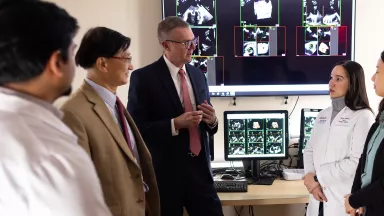Cardiogenic Shock
As part of an academic health system, Montefiore Einstein Center for Heart and Vascular Care supports the mission and guidelines of the U.S. Department of Health and Human Services (HHS). The following information is provided by HHS.
Life After Cardiogenic Shock
Cardiogenic shock is life-threatening, but it is treatable. As you recover from cardiogenic shock, it is important to follow your treatment plan and adopt healthy lifestyle changes to prevent another event.
You also may need follow-up treatment or support for implanted devices or complications of cardiogenic shock, including organ failure. If cardiogenic shock led to heart failure, your doctor may recommend a heart transplant.
Receive routine follow-up care
Follow your doctor’s instructions about your treatment plan.
- Get regular medical care. Ask your doctor how often you need to schedule visits for follow-up care.
- Take steps to prevent infection if you had a medical procedure or surgery. It is important to practice good hygiene and to properly clean and care for surgical incisions.
- Take your medicines as your doctor prescribes. Do not change the amount of your medicine or skip a dose unless your doctor tells you to.
- Tell your doctor if you have any new symptoms, if your symptoms worsen, or if you have problems with other medical conditions that may increase your risk for heart events.
Return to Treatment to review possible treatment options for cardiogenic shock.
Monitor your condition
Your doctor may recommend regular follow-up visits to monitor your condition and any medical device that supports your health after cardiogenic shock.
- If you have an implanted VAD or another type of medical device to help your heart work better, your doctor will check to make sure that the device is working properly. You will be given instructions on what to do if the device gives a warning that it is not working correctly.
- If your heart does not respond well enough to other treatments, your doctor may recommend a heart transplant. A total artificial heart may be an option for patients who had cardiogenic shock affecting both the left and right ventricles of the heart as they wait for a heart transplant. While you wait for a donor heart, you will need to follow your treatment plan carefully.
Adopt healthy lifestyle changes
Because cardiogenic shock is usually a serious complication of ischemic heart disease, your doctor may recommend a heart-healthy lifestyle, which includes:
- Heart-healthy eating, such as the DASH (Dietary Approaches to Stop Hypertension) eating plan. A heart-healthy eating plan includes fruits, vegetables, and whole grains and limits saturated fats, trans fats, sodium, added sugars, and alcohol.
- Being physically active. Routine physical activity can help manage ischemic heart disease risk factors, such as high blood cholesterol, high blood pressure, or overweight and obesity.
- Aiming for a healthy weight. Losing just 3 percent to 5 percent of your current weight can help you manage some ischemic heart disease risk factors, such as high blood cholesterol and diabetes. Greater amounts of weight loss can also improve blood pressure readings.
- Managing stress. Learning how to manage stress, relax, and cope with problems can improve your emotional and physical health.
- Quitting smoking. Visit Smoking and Your Heart and the National Heart, Lung, and Blood Institute’s Your Guide to a Healthy Heart. Although these resources focus on heart health, they include basic information about how to quit smoking. For free help and support to quit smoking, you can call the National Cancer Institute’s Smoking Quitline at 1-877-44U-QUIT (1-877-448-7848).
Participate in cardiac rehabilitation
If your cardiogenic shock was a complication of ischemic heart disease, you may be referred for exercise-based cardiac rehabilitation, to manage symptoms and reduce the chances of future problems. Studies have shown that exercise-based cardiac rehabilitation reduces the risk of hospitalization and cardiovascular death. Many people who have participated in cardiac rehab also report better quality of life.
Prevent a repeat event
If you had cardiogenic shock following a heart attack, your doctor will work with you to manage medical conditions that can raise your risk for heart problems and complications.
- If you have diabetes you will need to check your blood sugar and keep taking any prescribed medicines.
- You may be given a statin to lower your LDL cholesterol.
- Your doctor may recommend aspirin to prevent a repeat heart attack. Low-dose aspirin may help prevent blood clots and reduce the risk for repeat heart attacks and other complications of ischemic heart disease for some people, including those who have diabetes.
Emotional health
Living with a heart condition may cause fear, anxiety, depression, and stress. Talk with your health care team about how you feel. Your doctor may recommend you take steps that include:
- Talking to a professional counselor. Your doctor may recommend medicines or other treatments that can improve your quality of life.
- Joining a patient support group. This may help you adjust to life after cardiogenic shock. You can find out how other people who have the same symptoms as yours have coped with them. Your doctor may be able to recommend local support groups, or you can check with an area medical center.
- Seeking support from family and friends. Letting your loved ones know how you feel and what they can do to help you can help relieve stress and anxiety.
Learn the warning signs of serious complications and have a plan
A lack of oxygen-rich blood to the body can lead to problems throughout the body, including the heart, brain, and kidneys. Learn the warning signs of repeat heart attacks, stroke, and other complications of ischemic heart disease. Ischemic heart disease can lead to cardiogenic shock.
- Brain injury. Brain cells can begin to die within a few minutes after oxygen supply has been reduced or cut off. Symptoms include a short attention span, poor judgment, memory loss, and a decrease in physical coordination. Talk with your doctor about what to do if you or a loved one who had cardiogenic shock experiences the symptoms of brain injury.
- Heart attack. Signs and symptoms of heart attack include mild or severe chest pain or discomfort in the center of the chest or upper abdomen that lasts for more than a few minutes or goes away and comes back. It can feel like pressure, squeezing, fullness, heartburn, or indigestion. There may also be pain down the left arm. Women may also have chest pain and pain down the left arm, but they are more likely to have less typical symptoms, such as shortness of breath, nausea, vomiting, unusual tiredness, and pain in the back, shoulders, or jaw.
- Kidney failure. Learn about the symptoms of kidney disease, which can begin so slowly that you may not notice the symptoms right away. Talk with your doctor about whether you need regular testing of your kidney function and early treatments.
- Liver damage. When the liver does not receive enough oxygen from the blood, the result can be a condition called hypoxic hepatitis. Hypoxic hepatitis may go away when the cause of the cardiogenic shock is treated. Talk with your doctor about what tests you may need to monitor liver function and any special care or dietary changes you may need to care for your liver. Rarely, the liver may stop working after cardiogenic shock; this is called liver failure.
- Stroke. If you think someone may be having a stroke, act F.A.S.T. and perform the following simple test.
F—Face: Ask the person to smile. Does one side of the face droop?
A—Arms: Ask the person to raise both arms. Does one arm drift downward?
S—Speech: Ask the person to repeat a simple phrase. Is their speech slurred or strange?
T—Time: If you observe any of these signs, call 9-1-1 immediately. Early treatment is essential.
Learn about other precautions to help you stay safe
If a pulmonary embolism, a type of venous thromboembolism, caused your cardiogenic shock, your doctor will recommend follow-up treatment to break up or stabilize the clots and help blood flow return to normal. To prevent a repeat event, your doctor may adjust your medicine or treatment plan.
Syndicated Content Details:
Source URL: https://www.nhlbi.nih.gov/subscribe/4041
Source Agency: National Heart, Lung, and Blood Institute (NHLBI)
Captured Date: 2019-06-25 13:31:00.0
Cardiogenic Shock – Signs, Symptoms, and Complications
Signs and symptoms of cardiogenic shock vary depending on how quickly and how low your blood pressure drops. Cardiogenic shock may start with mild symptoms, such as feeling confused or breathing rapidly, or a person may have no symptoms and then suddenly lose consciousness. Cardiogenic shock is a life-threatening emergency. Complications may include organ damage or organ failure.
Signs and symptoms
The most common signs of cardiogenic shock are:
- Low blood pressure, which can make you feel dizzy, confused and nauseous
- Weak or irregular pulse
Other signs and symptoms of cardiogenic shock may include:
- Breathing problems, including rapid breathing and severe shortness of breath
- Bulging of large veins in the neck
- Clammy skin
- Cold hands and feet
- Loss of consciousness
- Swelling of feet
- Urinating much less than usual or not at all
- Any of these alone is not likely to be a sign or symptom of cardiogenic shock.
If you or someone else is having these signs and symptoms, call 9-1-1 right away for emergency treatment. Prompt medical care can save your life and prevent or limit organ damage.
Many symptoms of cardiogenic shock develop because the heart does not deliver enough blood to the body’s tissues and organs. As blood pressure drops during cardiogenic shock, the body tries to compensate by limiting blood flow to the extremities—the hands and feet—causing them to cool down. As blood flow to the brain drops, the person may become confused or lose consciousness. The kidneys may shut down, producing less urine. Reduced blood flow in the lungs may lead to fluid buildup in the lungs, making it hard to breathe.
Complications
In severe cardiogenic shock, the body’s organs do not get enough oxygen-rich blood. This can cause temporary or permanent damage to the vital organs of your body.
- Brain injury
- Kidney failure
- Liver damage
Look for
- Diagnosis will explain tests and procedures used to detect signs of cardiogenic shock.
- Treatment will explain treatment-related complications or side effects.
Syndicated Content Details:
Source URL: https://www.nhlbi.nih.gov/subscribe/4034
Source Agency: National Heart, Lung, and Blood Institute (NHLBI)
Captured Date: 2019-06-25 13:30:00.0
Cardiogenic Shock Risk Factors
You may have an increased risk of cardiogenic shock because of your age, any cardiovascular or other medical conditions you have, medical procedures, your race or ethnicity, and your sex.
Age
People who are 75 or older are at greater risk for cardiogenic shock. They are also less likely to receive emergency procedures to restore blood flow.
Learn the signs and symptoms of cardiogenic shock and ways to lower your risk for this condition.
Cardiovascular problems
Existing cardiovascular diseases can increase your risk of cardiogenic shock. These include:
- Atherosclerosis, which is plaque buildup in the arteries
- Cardiomyopathy, including Takotsubo cardiomyopathy, also called broken heart syndrome
- Conduction disorders
- Heart attack
- Heart failure
- High blood cholesterol
- High blood pressure
- High blood triglycerides
- Heart inflammation
- Heart valve diseases
- Ischemic heart disease
Other medical conditions
Other medical conditions that can raise your risk for cardiogenic shock include:
- Diabetes and prediabetes
- Overweight and obesity
- Pneumothorax, a type of pleural disorder that can lead to a collapsed lung
- Sepsis
Medical procedures
You may have a greater risk for cardiogenic shock if you have had coronary artery bypass grafting (CABG) in the past.
Race or ethnicity
Asian Americans and Pacific Islanders have a higher risk of cardiogenic shock than other racial or ethnic groups.
Learn more about prompt treatments for cardiogenic shock and ways to lower your risk for this condition.
Sex
Cardiogenic shock is more common in men than women.
Learn more about prompt treatments for cardiogenic shock and ways to lower your risk for this condition.
Syndicated Content Details:
Source URL: https://www.nhlbi.nih.gov/subscribe/4032
Source Agency: National Heart, Lung, and Blood Institute (NHLBI)
Captured Date: 2019-06-25 13:30:00.0
How Is Cardiogenic Shock Treated?
Cardiogenic shock is life-threatening and requires rapid diagnosis and identification of the cause, and emergency medical treatment. Treatments include medicines, heart procedures, and medical devices to support or restore blood flow in the body and prevent organ damage.
Because cardiogenic shock is a serious medical condition affecting multiple body organs, a team of medical specialists usually provides care. Some medical devices may be used temporarily to stabilize or support you until a permanent device can be implanted or until a heart transplant can be performed.
For people who have severe organ damage and may not survive after cardiogenic shock, Palliative care or hospice care may help them have a better quality of life with fewer symptoms.
Medicines
Medicine can help increase blood flow and protect against organ damage. Some medicines treat the underlying cause of cardiogenic shock, which is usually a heart attack. These medicines include:
- Anti-arrhythmia medicines to restore a regular heartbeat.
- Blood thinners or antiplatelet medicines to dissolve blood clots and reduce platelets that may be blocking the coronary arteries.
- Vasopressors and inotropes, such as norepinephrine and dobutamine, to increase blood pressure and blood flow out of the heart.
Procedures
The following medical procedures may be done right away to restore blood flow within your heart and throughout your body to prevent organ damage.
- Percutaneous cardiac intervention (PCI) to open coronary arteries that are narrowed or blocked by the buildup of plaque. A small mesh tube called a stent may be implanted after PCI to prevent an artery from narrowing again. Your doctor may repeat PCI later if any other coronary arteries are affected by plaque.
- Coronary artery bypass grafting (CABG) to improve blood flow to the heart. This procedure is usually done as soon as possible after a diagnosis of cardiogenic shock.
Medical Devices
You may need a medical device to aid, restore, or maintain blood flow, which may prevent organ damage from cardiogenic shock. Temporary devices sometimes support people who are waiting for surgery to implant a permanent device or for a heart transplant.
- Extracorporeal membrane oxygenation (ECMO) circulates the blood and supplies oxygen to the body’s organs through a heart-lung machine outside of the body. For ECMO devices, tubes connect to the large blood vessels near the base of the neck. The device draws blood from the right side of the heart, pumps it through the oxygenator, and then returns it to the left side of the heart so the oxygen-rich blood can be delivered throughout the body.
- An intra-aortic balloon pump (IABP) is no longer recommended to be used alone in cardiogenic shock, but it may improve survival when used along with ECMO. An IABP may also be used temporarily for people who have cardiogenic shock due to heart failure until another procedure can be done. An IABP helps the weakened heart muscle to pump as much blood as it can to vital organs. The IABP is placed in the aorta , and a balloon at the tip of the device inflates and deflates to match the heart’s pumping rhythm.
- Percutaneous circulatory assist devices (PCADs), including ventricular assist devices (VADs), can help support your heart until it recovers or while you are waiting for a heart transplant. A PCAD can help your heart work better if you are not eligible for a heart transplant. Risks include blood clots, bleeding, infection, device malfunction, and right-sided heart failure if a left VAD was used.
Additional emergency treatment
Additional emergency treatments may include:
- Continuous kidney dialysis to filter wastes out of the blood if the kidneys were damaged.
- Fluids given through an intravenous (IV) line inserted in one of your blood vessels to maintain normal blood volumes.
- Mechanical breathing support, such as a ventilator to protect the airway and provide extra oxygen.
- Oxygen therapy so that more oxygen reaches the lungs, the heart, and the rest of the body.
Look for
- Research for Your Health will explain how we are using current research and advancing research to treat people who have cardiogenic shock and other complications of ischemic heart disease.
- Participate in NHLBI Clinical Trials discusses our open and enrolling clinical studies that are investigating treatments and diagnostic procedures that may help cardiogenic shock.
- Life After will explain what your doctor may recommend including life-long lifestyle changes, medical care, and follow-up to prevent your condition from recurring, getting worse, or causing complications.
Syndicated Content Details:
Source URL: https://www.nhlbi.nih.gov/subscribe/4037
Source Agency: National Heart, Lung, and Blood Institute (NHLBI)
Captured Date: 2019-06-25 13:31:00.0
Cardiogenic Shock Causes
Causes of cardiogenic shock include heart attack and other heart problems, problems outside of the heart, and medicines or procedures.
A heart attack is the most common cause because it can damage the heart’s structure in different ways. Less often, a problem elsewhere in the body blocks blood flow coming into or out of the heart and leads to cardiogenic shock. For more information on the structure of the heart and how it works, visit our How the Heart Works Health Topic.
Heart attack and other heart problems
A heart attack is the most common cause of cardiogenic shock. Cardiogenic shock usually develops very quickly when it follows a heart attack.
Heart attacks can damage the heart’s muscles and tissues and cause serious heart conditions that may lead to cardiogenic shock. These include:
- Papillary muscle infarction or rupture. The muscles that help anchor the heart valves stop working or break when a heart attack cuts off their blood supply. If this happens, blood does not flow correctly between the heart’s chambers. The muscle infarction or rupture prevents the heart from pumping properly.
- Ventricular septal rupture. Damage from a heart attack can cause the wall that separates the ventricles, which are the heart’s two lower chambers, to break down. Without the wall to separate them, the ventricles cannot pump properly.
Other heart conditions, such as heart failure or arrhythmia, can reduce the heart’s ability to deliver oxygen -rich blood to your organs, leading to cardiogenic shock. Injuries that damage the heart can also cause cardiogenic shock.
Inflammation plays an important role in cardiogenic shock.
At a molecular level, inflammation may cause cardiogenic shock. The low blood pressure caused by cardiogenic shock can also trigger a massive inflammatory response, leading to a vicious cycle and lowering the chance of survival.
If a heart attack or other problem damages the heart, an inflammatory response happens throughout the body. Cells release substances called cytokines, which then stimulate high levels of a gas called nitric oxide. Nitric oxide causes blood vessels throughout the body to relax and widen, leading to an even greater drop in blood pressure. The body also reacts in an opposite way by releasing other substances that make the blood vessels narrow. This can further reduce the flow of oxygen-rich blood to the vital organs and increase the risk of organ failure. When the heart itself does not get enough oxygen, its ability to pump blood weakens and the chance of survival drops.
Problems outside the heart
Cardiogenic shock can be caused by problems outside the heart, including fluid buildup in the chest causing cardiac tamponade, internal bleeding or blood loss, or pulmonary embolism, a type of venous thromboembolism. Trauma or injury to the chest can damage the heart so that it no longer pumps blood effectively. For example, injuries that bruise or put pressure on the heart can cause cardiogenic shock.
Medicines or procedures
Rarely, some medicines can cause cardiogenic shock if you take a dose that is too high or if your heart is not working well after a heart attack or other heart problem. Examples include heart medicines such as beta blockers or calcium channel blockers to treat high blood pressure. It is rare for medicines to cause cardiogenic shock, and you can lower your risk by taking the right doses of medicines at the right time.
Very rarely, a heart procedure, such as cardiac catheterization, may injure the heart itself or cause arrhythmia, leading to cardiogenic shock.
Cardiogenic shock usually is caused by heart problems. What causes other types of shock?
Shock can occur when your body does not get enough oxygen-rich blood for any reason and may lead to tissue damage and organ failure. Cardiogenic shock is usually caused by poor pumping function of the heart. Other causes of shock include:
- Bleeding, which can cause shock by reducing the amount of blood in circulation, depriving the vital organs of oxygen.
- Infections can cause septic shock, which is an overwhelming immune response to infection that can affect the blood vessels.
- Reactions to drugs or severe allergic reactions, which affect the blood vessels’ ability to relax and tighten so they cannot maintain normal blood pressure. If the blood vessels respond too much, the body may go into shock.
Look for
- Treatment will discuss emergency life support that first responders or doctors provide for cardiogenic shock.
Syndicated Content Details:
Source URL: https://www.nhlbi.nih.gov/subscribe/4030
Source Agency: National Heart, Lung, and Blood Institute (NHLBI)
Captured Date: 2019-06-25 13:30:00.0
Cardiogenic Shock Diagnosis
Your doctor will check your medical history, perform a physical exam, and do tests and procedures to diagnose cardiogenic shock. Tests are usually done after you have been admitted to a hospital for a possible heart attack or symptoms of shock. If the reason for the shock is that the heart is not pumping strongly enough, then the diagnosis is cardiogenic shock.
Medical history
Your doctor will ask you or your family members about your medical history, especially any symptoms of a heart attack before you became ill. Your doctor will also want to know about any medicines you are taking.
Physical exam
During a physical exam your doctor may:
- Check your hands and feet for cold temperature or swelling.
- Check your pulse. If your heart cannot pump strongly, your pulse may be weak and rapid. If cardiogenic shock was caused by doses of heart medicines that were too high, the heart rate may be normal or slow.
- Listen to your heart and lungs with a stethoscope for unusual sounds or heart rhythms.
- Measure how much you urinate to check how well your kidneys are working.
- Measure your blood pressure. Low blood pressure that does not return to normal on its own is a sign of cardiogenic shock.
Diagnostic tests and procedures
Your doctor may order the following tests and procedures to diagnose cardiogenic shock.
- Blood gas tests to check the amounts of oxygen and carbon dioxide in the veins and arteries.
- Blood tests to check the function of the heart, liver, and kidneys and look for increased lactate levels.
- Cardiac CT scan to create a three-dimensional image of the heart to detect or evaluate heart disease or problems with heart function and its valves.
- Chest X-rays to examine the heart and lungs.
- Coronary angiography to look at the flow of blood through the heart and blood vessels.
- Echocardiography to assess blood flow in and out of the heart and look for heart problems.
- Electrocardiogram (EKG or ECG) to identify abnormal heart rhythms and confirm whether a heart attack has occurred.
Reminders
- Return to Risk Factors to review lifestyle and other factors that increase the risk of developing cardiogenic shock and its complications.
- Return to Screening and Prevention to learn about heart-healthy lifestyle habits that may reduce the risk for cardiogenic shock.
- Return to Signs, Symptoms, and Complications to review common signs and symptoms of cardiogenic shock.
Syndicated Content Details:
Source URL: https://www.nhlbi.nih.gov/subscribe/4035
Source Agency: National Heart, Lung, and Blood Institute (NHLBI)
Captured Date: 2019-06-25 13:30:00.0





